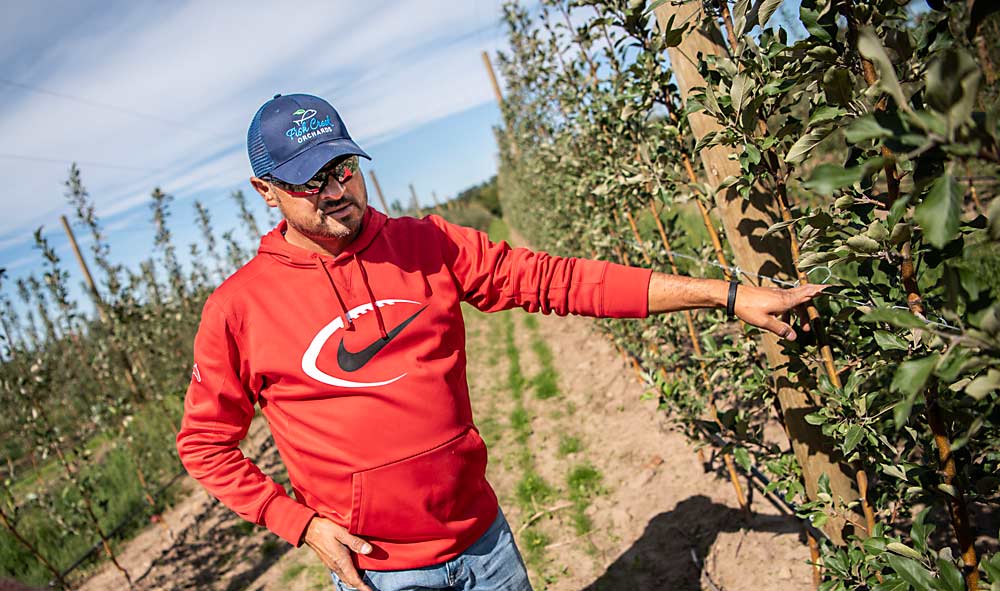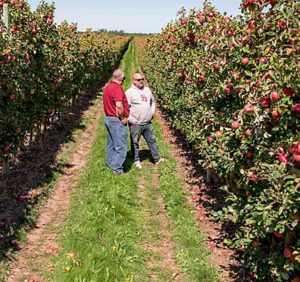
On his journey from seasonal worker to orchard owner, Jose Iniguez learned a lot of valuable lessons about managing farm employees, and he’s more than willing to share them. After all, he says part of what makes a good manager is being an “open book.”
Good Fruit Grower asked Iniguez, co-owner of Lamont Fruit Farm and Fish Creek Orchards in Western New York, to share some of the management lessons he’s learned over the years.
Originally from Mexico, Iniguez spent four years in Washington state before moving to New York, where he joined Lamont Fruit Farm at age 19 in 1994. Rod Farrow, former owner of Lamont Fruit Farm, partner in Fish Creek Orchards and Good Fruit Grower’s 2020 Grower of the Year, noticed Iniguez’s talent with people and his eye for precision. Farrow moved him up the ranks, eventually naming Iniguez one of his successors, along with grower Jason Woodworth.
Iniguez learned a lot of management lessons from Farrow, but he figured out a lot on his own, too. His background helped him there. Lamont Fruit Farm has hired H-2A workers from Mexico since 1998, and Iniguez has worked with many of the same employees for more than two decades. They’ve built up mutual trust and respect over the years. And being Hispanic, Iniguez knows the language and culture of his workers. He doesn’t just talk to them about pruning, he also shows interest in their lives.
“You have to be a human before a boss,” he said. “As soon as they trust you, they can do everything for you.”
To build that relationship, Iniguez makes a point to say “good morning” to all of his employees. If he knows they have a problem or are going through a personal difficulty — maybe somebody is sick back home — his “good morning” might be a bit softer. He’ll spend just a little more time with them. Often, all he has to do is listen for a few minutes.
Occasionally, a worker will tell him he needs to go back home, Iniguez said. That can be a tough adjustment, but the farm owners have learned how to deal with it.
For daily work, Iniguez and Woodworth always plan ahead, and they share those plans with their employees. The employees prefer it that way.
“We always set our bar in the morning,” Iniguez said. “How high are we going to go? Most of the time, our guys exceed or accomplish it.”
He recalled an incident about a dozen years ago, when a big hailstorm damaged apples in every one of their orchards. Iniguez, Farrow and Woodworth had to figure out what was salvageable and the best way to pick and sort it. After crunching the numbers and talking it through, they told their employees that picking the apples would only be profitable if 80 percent of the fruit met the Extra Fancy grade. The workers talked amongst themselves, figured out a way to meet that goal, and started divvying up tasks. Of the fruit picked, 85 percent were graded Extra Fancy, Iniguez said.
“You have to be open with them,” he said. “Explain to them that this is the goal, this is the problem. Make them part of the solution.”
Iniguez’s other strategies: Reward employees for their hard work. Buy them lunch. It can cost a lot, but it makes them feel appreciated. Be fair to everybody. If you promise to do something, follow through on it. And don’t be afraid to spend money on training — any kind of training. The more employees are exposed to certain concepts, the more they’ll master them, he said.
“We spend a lot of money on training, but it’s worth it,” Iniguez said.
Lamont Fruit Farm is known for its embrace of precision orchard management. One of the challenges is teaching new precision techniques to workers and convincing them to change the way they’ve been doing certain tasks.
Iniguez always starts with a number. Let’s say he wants 60 apples per tree. He’ll tell his pruning and thinning crews to aim for 30 branches and two buds per branch, he said. That’s for Gala; they leave extra buds for Honeycrisp as an insurance policy.
If he’s teaching his crew a new pruning style, Iniguez will spend the first few days making sure they master it. He’ll prune a few trees as an example, and he always pushes them to prune to the exact number. The sooner you give them a number, the sooner they’ll make that their goal, he said.
“Our guys love information,” he said. “It’s not about being faster, it’s about counting apples.”
—by Matt Milkovich







Leave A Comment